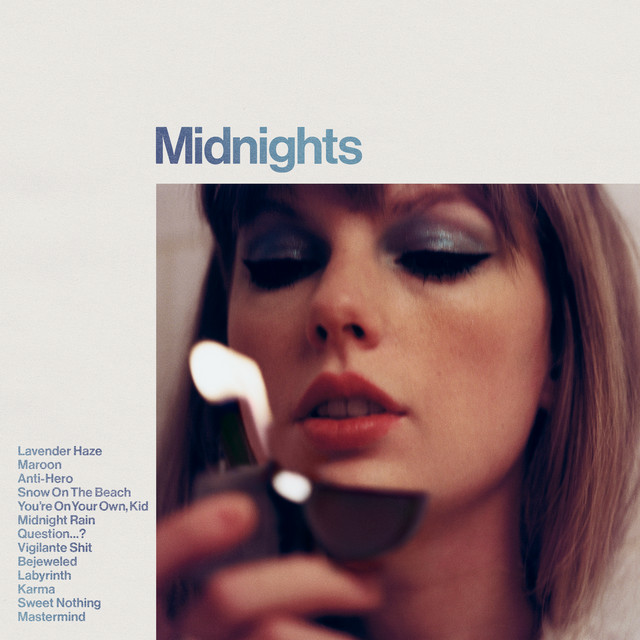A review of Taylor Swift’s newest album “Midnights”
November 3, 2022
Whether you love her, hate her or couldn’t care less, Taylor Swift, through the release of her newest album “Midnights,” has cemented her status as a timeless pop-culture icon. Regardless of the debatable quality of the new music, “Midnights” provides lyrical closure to many of the artist’s long standing public storylines and conveys feelings of triumph and contentful pride for whom she has become. For faithful fans, this message makes the record a beautiful and successful piece, despite the doubts of music critics.
As a lifelong but hardly avid Swift fan, or “Swiftie,” myself, I have experienced the journey of Swift’s music alongside my own life developments. Some of my favorite childhood memories are centered around Swift’s music. I remember bonding with my little sister as we screamed along to the albums “Red” and “Fearless” for the hundredth time, at the expense of our parents. Memories of my first crush are set to the theme music of “You Belong With Me,” from “Fearless,” and I cried to “Back to December,” from the album “Speak Now,” when it didn’t work out.
I have to admit, my commitment waned during Swift’s turn toward pop, as it didn’t feel familiar or relatable anymore. At the time, I also wasn’t quite internet-savvy enough to understand the full extent of the scandal when Kanye West took the microphone away from Swift during her win at the 2009 MTV Video Music Awards. This hindered my ability to understand where this new sound was coming from. Of course, I still listened to “1989” and “Lover” but when “Folklore” was released during the pandemic, I found myself thrown back into Taylor Swift lore with a renewed love for the maturing music that reflected my maturing experiences. Now, with a return to her pop era music, her album “Midnights” revisits many of these moments but through a lens of thoughtful reflection and joyful pride. It’s the lifelong context that truly makes this album special for those who have been along for the whole ride.
Many of the songs in this album sound incredibly similar to music from Swift’s previous albums “Reputation,” “1989” and “Lover,” all of which fall into the pop music genre. As described by Riley Hodin ’25, the album is “pure, unadulterated pop bliss,” with catchy melodies and modern production. These songs utilize a heavy synth and strong reverb to create a big, airy sound. Layered vocals are built so high that there is practically a wall of harmony almost suffocating her voice. Many of the songs have bright pop melodies that make for easy car ride sing-alongs. But because this style is a callback to older music, the album fails to offer much new or revolutionary material. Quite literally, “Midnights” even samples parts of her old songs; “Questions…?,” track seven on the album, samples the popular song “Out of the Woods” within its first notes. The album largely falls back on Swift’s pre-pandemic bread and butter, which inevitably invokes criticism that the album is nothing special.
However, for the fandom, it’s the lyrics that makes this album scream-worthy, as evidenced by my little sister’s eardrum-shattering sleepover on the night of the album’s release. Perhaps, this is the point. The fact is, Swift can fall back on old sounds and write whatever music she wants to with guaranteed success — a truly impressive feat for an artist. Over the years, Swift has built a fanbase unlike any other. Protective of the Swift fandom, perhaps to a fault, Swifities are known to be almost violently obsessed with the icon. Therefore, this album is dedicated to her unwavering fanbase. Using callbacks to old songs and old dramas in both the lyrics and music videos, Swift has created an album by and for her fans.
“Karma’s a relaxing thought/Aren’t you envious that for you it’s not?,” she sings in “Karma.” Most people could recognize the ways this pointed line jabs at West’s constant drama, but only committed Swift fans can fully appreciate how it simultaneously demonstrates her personally reflecting perspective. Despite the roadblocks, hate, sexism and critical public eye, she has learned how to stay above it all by reconnecting with herself and her values.
Now, she isn’t pulled down by celebrity drama and instead seems to pity those who are still caught up in it. When she sings “Karma is my boyfriend,” Swift shows she can trust herself and tells her fans to ignore the haters and instead focus on the love and joy she has created for herself. The line also holds a double meaning by referencing her boyfriend, actor Joe Alwyn, who is rumored to now be her fiancé.
Some of these lyrics are criticized as cheesy or corny, but in fact, they serve to further the blissful sound of the album. As lifelong fans can attest, Swift has been through a dramatic journey under the scrutiny of the public eye, one that could not have been simple or easy. But in reflecting on the past, Swift and her fans can be grateful for the tumultuous ride because it resulted in the success she has now. The album reflects Swift’s triumphs, joy and ultimately, her success. After all she has been through, Swift gets to create art that brings her joy and her fans are proud to continue supporting her.













